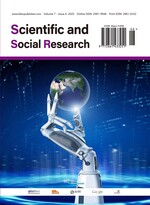Abstract
This study explores the psychological adaptation process of individuals in changing relationships, integrating object relations theory and emotion-focused therapy (EFT) to provide both theoretical analysis and practical insights. The case study focuses on Michi (pseudonym) and her emotional fluctuations in workplace relationships, revealing how psychological mechanisms such as projective identification, true self and false self, and the paranoid-schizoid and depressive positions influence individuals’ perceptions of relationships and emotional regulation. The study finds that Michi experienced a psychological transition from anxiety and anger to self-awareness and emotional regulation as she faced the promotion of her colleague and the changes in their relationship. Her initial emotional turmoil stemmed from high expectations of attachment and manifested as projective identification and control needs. As she engaged in self-exploration, she employed EFT techniques such as emotional experience and the empty-chair work to conduct an internal dialogue, ultimately achieving a renewed understanding and integration of her emotional patterns, relational expectations, and self-stability. Theoretical analysis suggests that psychological distress in changing relationships is not only influenced by external environmental changes but also significantly shaped by internal object relation patterns and self-stability. Through EFT’s emotion-focused interventions, individuals can more effectively identify and transform maladaptive emotional patterns, thereby enhancing psychological flexibility and autonomy in the face of relational changes. The study emphasizes that the core of psychological growth lies not in controlling external relationships but in the stability and integration of the inner self. It also provides theoretical and practical guidance for workplace relationship adjustment, emotional management, and psychological counseling.
References
Chen JX, Chen W, 2015, Three Turns of Projective Identification: Conceptual Evolution and Comparative Analysis. Advances in Psychological Science, 2015(23): 614–620.
Xu PP, 2008, A Pure Model of Object Relations: A Critical Review of Fairbairn’s Personality Object Relations Theory. Journal of Nanjing Normal University (Social Science Edition), 2008(5): 113–118.
Guo BY, 2009, Developmental Psychoanalysis. Historical Context and Theoretical Connotations, 2009(5): 98.
Xi HL, 2006, A Review of Winnicott’s Child Psychoanalysis. Journal of Nanjing Normal University (Social Science Edition), 2006(5): 94.
Xu PP, 2008, A Pure Model of Object Relations: A Critical Review of Fairbairn’s Personality Object Relations Theory. Journal of Nanjing Normal University (Social Science Edition), 2008(5): 115.
Wang LJ, 2021, Leader of the British Independent Group: Winnicott’s Intellectual Tradition and its Historical Influence. Journal of Nanjing Xiaozhuang University, 2021(2): 63–69.
Wang LJ, 2021, Leader of the British Independent Group: Winnicott’s Intellectual Tradition and its Historical Influence. Journal of Nanjing Xiaozhuang University, 2021(2): 63–69.
Xu PP, 2005, A Study of Fairbairn’s Personality Object Relations Theory, thesis, Nanjing Normal University.
Xu PP, 2006, Self, Object Relations, and Personality—Fairbairn’s Pure Psychological View on Personality Development. Journal of Nanjing Normal University (Social Science Edition), 2006(5): 99.
Xu PP, 2005, A Study of Fairbairn’s Personality Object Relations Theory, thesis, Nanjing Normal University, 16.
Xu PP, 2005, A Study of Fairbairn’s Personality Object Relations Theory, thesis, Nanjing Normal University, 33.
Wang GF, 2001, A Review of Melanie Klein’s View on Children’s Psychic Structure. Journal of Nanjing Normal University (Social Science Edition), 2001(1): 105.
Sun GJ, 2015, A Study on Joan Riviere’s Psychoanalytic Thought, thesis, Nanjing Normal University.
Wang LJ, 2017, Joan Riviere’s Theory of Infant Mental Development and its Application. Journal of Nanjing Xiaozhuang University, 2017(1): 85.
Chen YY, 2021, Exploring Emotional Pain: An Integrative Psychotherapy based on EFT. People’s Posts and Telecommunications Press, Beijing, 6–7.
Li XF, Liang QY, Liu BY, et al., 2016, Research on the Development and Application of Object Relations Theory. Science & Technology Vision, 2016(4): 82–83 + 123.
Hu YC, 2008, The Spiritual Map of “Human Nature at Birth”: A Study on Psychoanalytic Object Relations Theory, thesis, Jilin University, 44.
Wang LJ, 2021, Leader of the British Independent Group: Winnicott’s Intellectual Tradition and its Historical Influence. Journal of Nanjing Xiaozhuang University, 2021(2): 65.
Wang, GF, 2012, The Development Path of Psychoanalytic Object Relations Theory. Journal of Nanjing Normal University (Social Science Edition), 2012(1): 114–115.
Guo BY, 2007, A Century of Development: The Integrative Logic of the Psychoanalytic Movement. Journal of Nanjing Normal University (Social Science Edition), 2007(5): 93–98.
